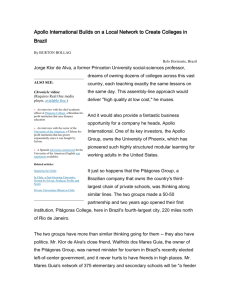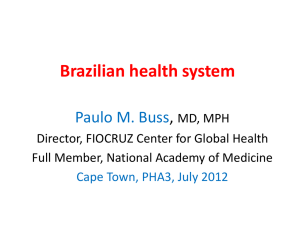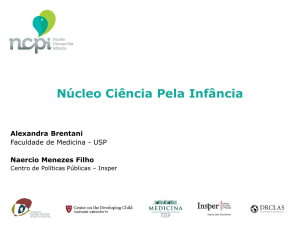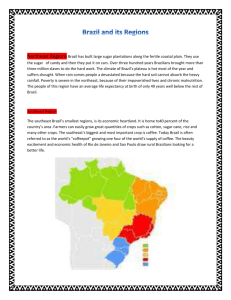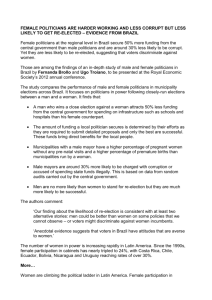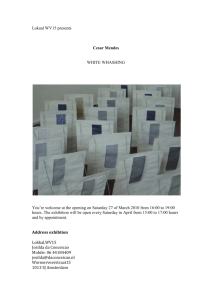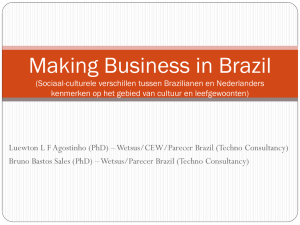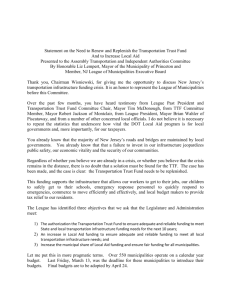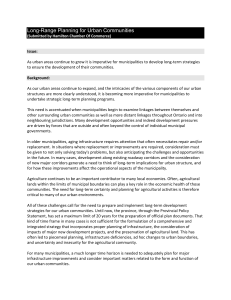Supporting the implementation of the Brazilian National
advertisement
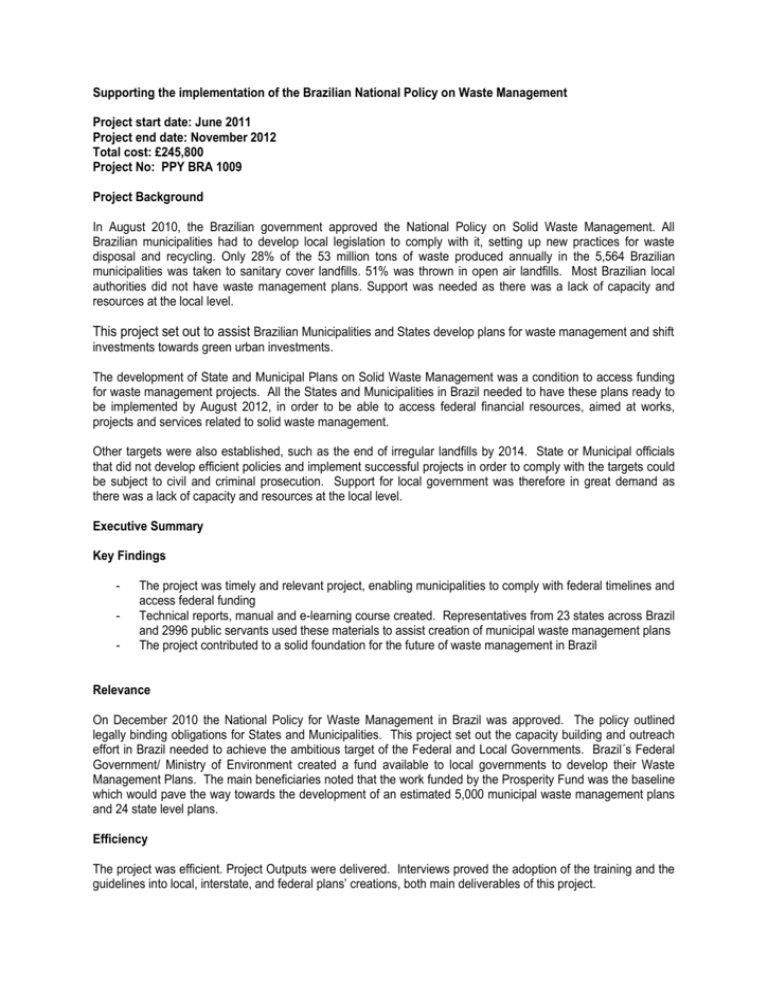
Supporting the implementation of the Brazilian National Policy on Waste Management Project start date: June 2011 Project end date: November 2012 Total cost: £245,800 Project No: PPY BRA 1009 Project Background In August 2010, the Brazilian government approved the National Policy on Solid Waste Management. All Brazilian municipalities had to develop local legislation to comply with it, setting up new practices for waste disposal and recycling. Only 28% of the 53 million tons of waste produced annually in the 5,564 Brazilian municipalities was taken to sanitary cover landfills. 51% was thrown in open air landfills. Most Brazilian local authorities did not have waste management plans. Support was needed as there was a lack of capacity and resources at the local level. This project set out to assist Brazilian Municipalities and States develop plans for waste management and shift investments towards green urban investments. The development of State and Municipal Plans on Solid Waste Management was a condition to access funding for waste management projects. All the States and Municipalities in Brazil needed to have these plans ready to be implemented by August 2012, in order to be able to access federal financial resources, aimed at works, projects and services related to solid waste management. Other targets were also established, such as the end of irregular landfills by 2014. State or Municipal officials that did not develop efficient policies and implement successful projects in order to comply with the targets could be subject to civil and criminal prosecution. Support for local government was therefore in great demand as there was a lack of capacity and resources at the local level. Executive Summary Key Findings - The project was timely and relevant project, enabling municipalities to comply with federal timelines and access federal funding Technical reports, manual and e-learning course created. Representatives from 23 states across Brazil and 2996 public servants used these materials to assist creation of municipal waste management plans The project contributed to a solid foundation for the future of waste management in Brazil Relevance On December 2010 the National Policy for Waste Management in Brazil was approved. The policy outlined legally binding obligations for States and Municipalities. This project set out the capacity building and outreach effort in Brazil needed to achieve the ambitious target of the Federal and Local Governments. Brazil´s Federal Government/ Ministry of Environment created a fund available to local governments to develop their Waste Management Plans. The main beneficiaries noted that the work funded by the Prosperity Fund was the baseline which would pave the way towards the development of an estimated 5,000 municipal waste management plans and 24 state level plans. Efficiency The project was efficient. Project Outputs were delivered. Interviews proved the adoption of the training and the guidelines into local, interstate, and federal plans’ creations, both main deliverables of this project. The implementer worked to a tight deadline to meet ambitious deadlines and outputs. In order to ensure that the project would deliver all the planned outputs within the deadlines, ICLEI´s strategy was to internalize more work based on its technical background and experience, as well as sub-contracting to external consultants to provide more specific technical inputs, which provided increased control of quality and deadlines. Therefore, costs under administrative/managerial line also included technical work by ICLEI experts. Furthermore, ICLEI validated all project deliverables with the Brazilian Ministry of Environment, which required significant coordination between the project’s collaborators. All goods and services used in the project (consultants, tutors, air tickets, hot site etc.) were chosen in the most cost-efficient way. Effectiveness The project showed solid effectiveness. Since the main challenge of the project was to reach out to a significant number of states and municipalities in Brazil, the development of web based training (e- learning platform) to support the Waste Management Plan guideline enabled representatives from 23 of 26 states in Brazil and a total of 2,996 public servants to undergo the training. A total of 488 municipalities completed their Waste Management Plan, of which 35 have been initially identified by ICLEI to have enrolled the official training and used the Guidelines. Sustainability The project presents good sustainability. Although the achievement of fully developed waste management plans across all municipalities fell short by 10%, it was the initial building block of a very ambitious goal. Local governments who demonstrated interest in developing their plans were able to bid for Federal Funds to help them do so. The Ministry of Environment also expressed the intention to set funds aside for the implementation of the plans. Impact Although immediate benefits of this project were increased capacity of civil servants in Brazil as well as a number of identified waste management plans development, it was too early to define and quantify the wider impact the project will have related to social effects (quality of life in local communities improved), number of jobs created and potential investment of UK companies during the implementation period of this local plans. The Federal Government agreed financial support worth £23 million for local governments to develop their plans. Main Lessons Learned The project proved the importance of having the host government as a beneficiary It is also important to mention that when designing/ evaluating projects it is a plus to have legally binding targets that strengthen the fulfillment of our project purpose
